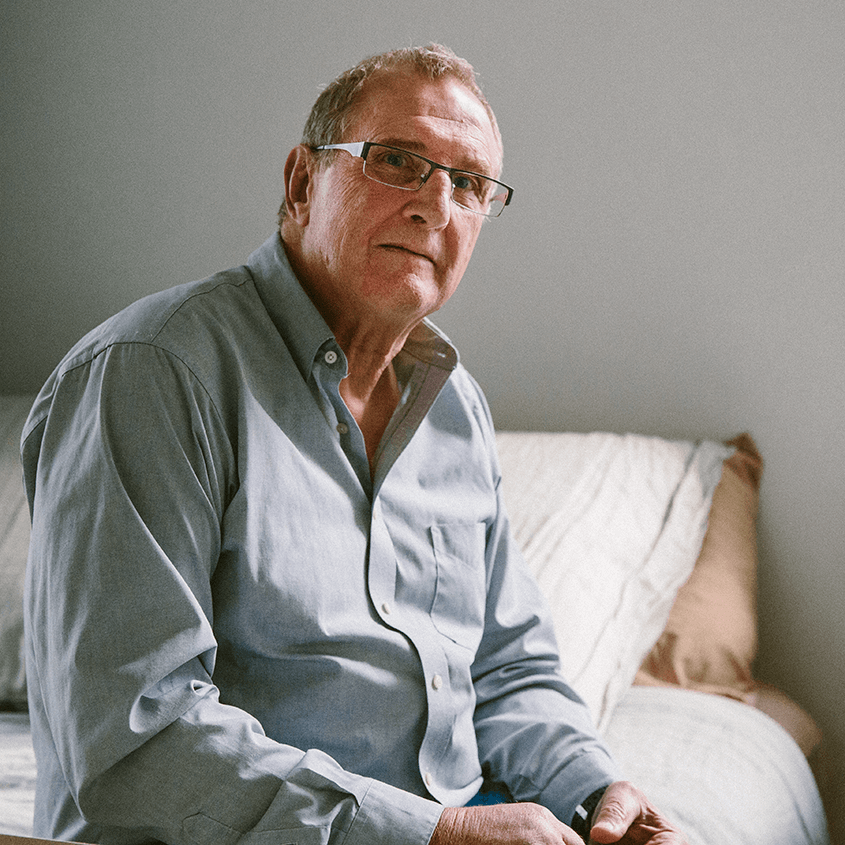Ask anyone with tattoos and they’ll tell you every bit of body art means something. But it’s fair to say Graeme Holdsworth’s short script of ink means more than most. The single word, Anicca - Sanskrit for ‘impermanence’ - hides beneath the watchband on his left wrist.
“I look at it whenever I need reminding that what’s happening now won’t be happening in a minute’s time.”
For the retired architect and project manager who spent most of his life planning the future of multi-million dollar developments, a one-word reminder to live in the moment seems an odd choice. But to someone who was a habitual high achiever, it’s an important reality check.
“I was the first member of my family to graduate from university, the first to represent my State in sport and the first to suffer depression and attempt to take my own life.”
Sitting across a kitchen table from a man who looks like he could still pull an oar in a State surfboat, that last statement is even more jarring than it sounds. But Graeme insists his situation isn’t unusual.
“The myth that depression comes from weakness or a character flaw means many think it would never affect apparently successful people.
“Truth is, depression doesn’t discriminate.
“And,” he adds, “it’s not something that just goes away once you’re told, as I was, to toughen up and get on with life.
“Depression’s an illness that cost me my marriage, my career and very nearly my life…it doesn’t get much more serious than that.”
So how exactly did it ‘get to that’? Graeme admits that for a long time nobody - least of all himself - was prepared to admit anything was wrong.
“There just never seemed to be the right time or place to confront the problem - to talk about it.”
He’s also quick to demolish another myth he believes leads to people remaining silent, especially at work; that depression is just an inability to handle stress.
“It only seems that way because depression robs you of your ability to cope with it as easily as you once did.”
This highlights a larger problem, because, despite the fact that depression affects 256 million people around the world, most of us still fear the consequences of raising our hands.
Graeme doesn’t dwell on the attempt to take his own life. Instead, he uses it to begin the story of how he got that life back.
“Thankfully, I was saved and over the next few years, with help from my GP, a psychologist and a psychiatric clinic, I found a treatment that worked.”
It’s an experience Graeme now shares as a public speaker, helping others move positively beyond depression.
“I tell people who are feeling depressed or anxious to lose the shame and get help from their GP or a mental health professional early.
“But just as important, we all need to lose the fear of starting a conversation if we’re worried about family, friends or workmates.
“For instance, if there’s someone who used to attend social functions but seems to have dropped off the radar, just get on the phone and ask if they’re OK.”
Seven years on, it’s fair to say Graeme’s survival has been life changing.
“I’ve learned to be patient, to not be so hard on myself when things don’t work out and, with the support of my long suffering neighbours, I’m also learning the piano.”
And further evidence of recovery is parked around the walls of Graeme’s dining room.
“Depression’s a mental illness, but it manifests physically in a lot of ways, so exercise is important to stay ahead of it.
“After my worn out shoulder stopped me swimming, I got on a bike and I haven’t looked back.”
Indeed, he’s now so involved in the cycling community, the crew at his local bike shop have become Graeme’s surrogate family. A family that he’s discovered looks after its own.
“If I haven’t been in for a week or so, someone from the shop will call for a chat and ask if I’m OK.”
In that sense, Graeme Holdsworth’s not simply an example of how depression is curable and suicide can be prevented; he’s living proof of how important it is that we take care of each other.
“Though I wouldn’t wish my experience on anyone, I’ve emerged at the other end a much better person,” he says.
“I’m grateful I got the chance to live a more meaningful life, and I’ve learned so much more about myself and other people.”
The tattoo, it seems, isn’t the only permanent change.
---
Need help navigating a chat with someone who might be struggling? Use these simple tips to open and guide the conversation.
If you, or someone you know, is feeling low, don't hesitate to reach out for support using these local support resources.











